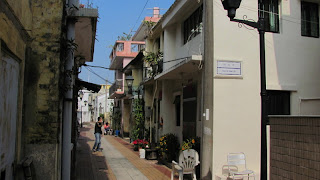Lessons from Macau: The Other Side (Hopefully) of COVID-19
Lessons from Macau
The Other Side (Hopefully) of
COVID-19
This is the week COVID-19 became real to people in America. These past months images of people wearing masks, streets empty of people, hospitals overcrowded--they have all been in "foreign" countries. Some Americans (not all) believed (falsely) that a wall could keep all this away. But alas, this did not work. Viruses observe no borders, nationalities, ages, incomes, genders, or political preferences. The only way to slow the virus is to follow the guidance of health experts: observe good personal hygiene, social distance, and most importantly, test to find out who may have the virus.
Here in Macau the virus became very real to us on February 4. Only a few days before then I returned here from a short Chinese New Year visit to Taiwan to visit family there. While there we were being observant of the situation, watching the news of what was happening in mainland China, and stocking up on masks. It started to feel "real," but remained somewhat distant from us. Then we came back to Macau and the situation was feeling more precarious by the day, but not yet dangerous. Schools, including the University of Macau, were closed indefinitely, with instruction to be offered online. All large gatherings, defined as more than 5 persons, were to be canceled and discouraged. Anyone who had been in mainland China over the holiday was to self-quarantine for 14 days at home. And all persons were to wear masks. The government then provided distribution points for the purchase of masks, which were sufficient to meet the needs of the populace.
Then, on February 4 even these measures were not enough. A casino worker tested positive for covid-19. The very next day, the Macau government took the unimaginable, but in hindsight correct step, of shutting all of Macau's casinos. That is when I knew on a deeply felt, personal and tangible level, that the situation was serious.
Initially there was some panic in Macau. People went to the grocery stores to stock up on supplies, fill up on gasoline, and do the kinds of things that we do when a strong typhoon is approaching. But that passed quickly. The Macau government held daily press briefings, explained in an honest way what was happening, and announced the steps they were taking to protect the public and deal with the situation. Public confidence was restored, and we accepted without protest the increased measures taken to monitor public health, such as frequent temperature checks, and here on the campus registering our comings and goings. The government also promised that food would continue to be delivered.
Then on February 14 the government announced a series of fiscal measures: relief from taxes for small businesses and residents, waiving fees for electricity, gas, and water in the coming months, moving forward the time when Macau residents would receive their annual payout, and 3,000 MOP (about 375 USD) vouchers to be given to all residents for small purchases, to be distributed after the abatement of the virus.
The situation here is slowly returning to "normal." On March 6 the last coronavirus patient was released from the hospital. The government resumed full services the last week of February. And just recently, a timeline for the resumption of classes has been announced for primary and secondary students. (No official word has been given from the University of Macau. But it should come soon.)
Macau's handling of covid-19 thus far can be called a success. The government has performed admirably, even compared with Hong Kong which is normally the "good" place, but in recent times has shown itself to not be well managed. The freedom of movement has been limited. Businesses and schools have been impacted. And the economy has suffered major losses, with revenues down 88% year-on-year, for February 2020. That is a major hit! But we here have confidence that in the long run, this situation will improve. And the government is willing to spend at this moment.
What lessons can be learned from little Macau? First, good government matters. When faced with a crisis, it is essential that a government be honest, open, and implement the best policies available. Second, and this follows from the first, the public must be informed and engaged. Here in Macau panic was very quickly abated. People felt confident that the leadership could be trusted, and did what was asked of them. Third, know that the future is unpredictable. I thought that 2019 was a difficult year for many reasons. (I'm writing this one year since the tragic shooting in New Zealand.) And there were many tragedies. But everything that happened in 2019 in retrospect looks like the "normal" litany of bad things. Covid-19 has changed the world, and it will be a long time until it feels normal again.
So America, Europe, Africa, Australia, New Zealand, and the other parts of Asia, look to the rest of the world, even little Macau, for lessons that can be learned. We are stronger when we work together.



Comments
Post a Comment
Feel free to comment on my blog. Please keep comments civil and relevant.